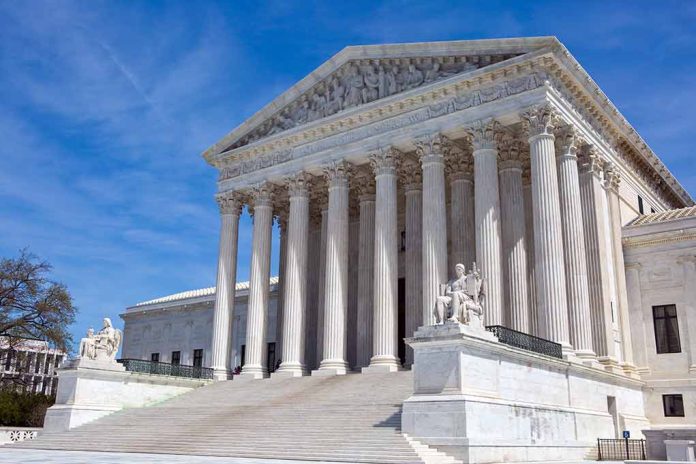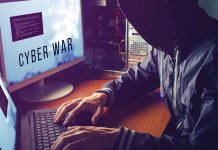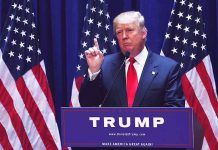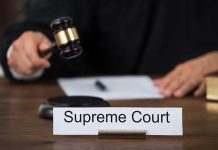
Oh, boy. Here we go again. The liberals are clutching their pearls and the legal community is spinning. The Supreme Court released a brand new ruling on obstruction charges, forcing everyone to hit pause and take a much closer look at a number of cases related to January 6, 2021. Uh oh.
For those of us who’ve been following this saga with a skeptical eye, it’s about time. The left’s narrative of an “insurrection” has been crumbling faster than a sandcastle at high tide, and this latest development might just be the wave that washes it away for good.
The ruling in question centers on the interpretation of a federal obstruction statute that’s been wielded like a cudgel against Jan. 6 defendants. The Supreme Court, in its infinite wisdom (and yes, that’s only partially sarcastic), has decided that maybe, just maybe, the government’s been a tad overzealous in its application of this law.
One of the cases affected by this ruling is that of Guy Reffitt, a Texas man who’s been cooling his heels in federal prison since 2021. Reffitt’s attorney, William Shipley, didn’t mince words when he said, “This is a significant development that could potentially impact numerous cases stemming from the events of January 6.”
Now, let’s be clear: nobody’s saying that breaking the law is okay. But there’s a world of difference between trespassing and staging a full-blown coup, despite what some hysterical commentators on the left would have you believe. This ruling suggests that the courts are finally starting to recognize that distinction.
The obstruction charge in question, 18 U.S.C. § 1512(c)(2), has been a favorite tool of prosecutors in these cases. It’s a bit like using a sledgehammer to crack a nut – sure, it gets the job done, but it’s hardly the most appropriate tool for the task. The statute was originally intended to prevent tampering with evidence in corporate fraud cases, not to prosecute protesters who got a little too rowdy.
Of course, the usual suspects are up in arms about this development. Rep. Jamie Raskin, D-Md., who never met a Jan. 6 defendant he didn’t want to throw the book at, called the ruling “a setback for justice.” One has to wonder if Rep. Raskin’s idea of “justice” involves due process at all, or if he’d prefer to skip straight to the sentencing phase.
But for those of us who still believe in the quaint notion of “innocent until proven guilty,” this ruling is a breath of fresh air. It’s a reminder that even in these politically charged times, the law is still the law, and it should be applied fairly and consistently.
The implications of this ruling extend far beyond the immediate cases it affects. It calls into question the entire strategy employed by the Department of Justice in prosecuting Jan. 6 defendants. If the obstruction charge was improperly applied in these cases, what other overreaches might we find if we start looking closely?
It’s worth noting that this isn’t just about scoring political points. Real people’s lives have been upended by these prosecutions. Families have been torn apart, careers have been ruined, and reputations have been tarnished – all based on charges that the Supreme Court now suggests may have been improperly applied.
Take the case of Guy Reffitt, for instance. He’s been sitting in prison for three years, convicted on five charges including the now-questionable obstruction charge. His family has been through hell, and for what? Because he got caught up in a protest that got out of hand? It’s enough to make you wonder if the punishment really fits the crime.
Of course, the left will argue that this is all just a technicality, that these people are still guilty of… something. But in a nation of laws, technicalities matter. They’re what separate a justice system from a kangaroo court. And if we start ignoring them when it’s convenient, we’re on a slippery slope to a place none of us want to go.
This ruling also raises some interesting questions about the narrative that’s been pushed about Jan. 6. If these weren’t hardened insurrectionists hell-bent on overthrowing the government, but rather misguided protesters who got carried away, doesn’t that change the entire complexion of the event? It’s a question that’s sure to keep political pundits busy for months to come.
As we move forward, it’s crucial that we keep a close eye on how these cases develop. Will prosecutors double down and find new charges to bring? Will more defendants be released as their convictions are reviewed? And perhaps most importantly, will this lead to a more balanced and nuanced understanding of what really happened on Jan. 6?
One thing’s for certain: this ruling has thrown a monkey wrench into the left’s carefully constructed narrative about Jan. 6. And while they scramble to adjust their talking points, the rest of us can take a moment to appreciate that sometimes, just sometimes, the system works the way it’s supposed to.
What does this ruling really tell us? For starters, it’s a pretty clear reminder of why our systems of checks and balances exists to begin with – and why it’s so important. We’re all passionate about the things we believe in – especially politics – but we can’t let ourselves get caught up in the heat of the moment, either. The law is even keel. It doesn’t care about how the media spins it or who wants to twist a political agenda around it. The law loves evidence and facts – and its pretty darn fair to everyone.
It’ll be interesting to see how some of these cases unfold after this latest ruling. At the end of the day, all defendants deserve fair treatment, no matter who they voted or.
So what do you think? Will the Jan. 6 defendants receive fairer treatment? Speedier trials? is this issue put to bed, or will it be challenged further? Let us know what you think by sending a message. We can’t wait to hear from you.
Reactions from Around the Web:
This sad American seems to have an issue with fair treatment.
#SupremeCourt rules for Jan. 6 rioter challenging obstruction charge??
We should start calling the #SCOTUS the #MAGASupremeCourt, if we aren’t already. This is INFURIATING.
We are losing our democracy in record time. https://t.co/xTdzzJmVyJ
— Turn Tennessee Blue #STANDWITHUKRAINE 🇺🇦 (@TurnTNBlue) June 28, 2024
Quite a few people are downplaying the ruling in general:
DOJ fact sheet echoes Garland in downplaying impact of SCOTUS ruling on Jan. 6 cases.
Notes 82% of convictions didn't involve this charge.
Also notes that just 27 people out of 1,400 are serving felony sentences only for obstruction of an official proceeding. pic.twitter.com/VXQcYtaXOe
— Aaron Blake (@AaronBlake) June 28, 2024
Quote of the Day:
“Every day some new fact comes to light – some new obstacle which threatens the gravest obstruction. I suppose this is the reason which makes the game so well worth playing.” ~Robert Falcon Scott
Joke of the Day:
My wife accused me of being a terrible lawyer.
I couldn’t defend myself.








